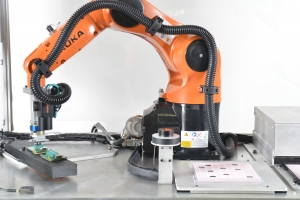What is a Robotic Integrator and why do I need one?
Robot Integrators customize the robot to fit the needs of the end user’s application. The Robot Manufacturers do not usually do this because they do not have the staff or resources to handle the needs of all end users. Integrators fill this gap with specialized design, engineering and programming resources.
A good integrator is a process specialist and is trained and supported by their robot manufacturer partner. They will help to define the problem or need in the end user’s process, find a solution, build it and test it. They will then integrate the robotic solution into the customer’s manufacturing processes and provide training to make sure that the end user can operate and maintain the system properly and successfully.
What to look for in a robotic integrator – The 5 C’s

Capabilities
Robot System integrators are not experts in every application. They will specialize in a select few. Most applications are very process intensive and selecting an integrator with a skillset that matches your application is key. You may want to think twice about selecting an integrator that specializes in material handling to do a welding application. Look for an integrator that has a track record of successful applications similar to yours. If your system requires custom tooling, find an integrator with experience in the type of tooling you need. The End of Arm Tooling gives your system functionality. A good integrator will understand the functional requirements of the tool and guide the tool-maker on design, payload, moment of inertia, and process requirements.
Concept
Consider the concept of the system closely. You want to make sure that the process is balanced and that you are not solving one issue by creating another. How is the integrator utilizing the features and technology within the system? Are you able to shrink the footprint of the cell or take advantage of a collaborative application by utilizing Functional Safety? Is the integrator rehashing something that was done once 20 years ago without taking advantage of today’s technology? A good integrator is a creative problem solver.

Cost
Make sure the true cost of your robotic system is clear in the proposal. Find out what the actual deliverables are so you can compare proposals more effectively. Understand the payment terms for the system. An integrator might charge 30% down with the order and then a milestone payment when the system engineering is approved. And then other payments along the way. Discuss how the integrator handles engineering change orders.
Capacity
Lead times to delivery fluctuate. Can the integrator deliver your system within the timeframe you are looking for?
Certification
In 2012 the RIA rolled out a Certified Robot Integrator Program in response to the needs of the industry. It is a benchmark for evaluating technical and robot safety as well as the overall business practices of integrators. The certification involves a rigorous process that includes an onsite audit, practical assessment of key personnel, safety training, etc. As your integrators if they are certified or working toward certification.
Also contact the robot manufacturer and ask if the integrator is part of their certified partner program and in good standing with the robot manufacturer.